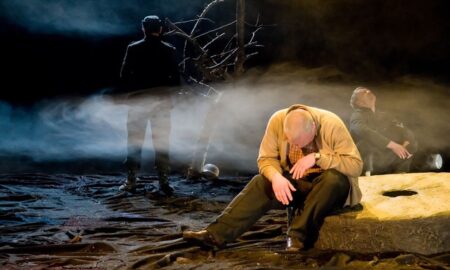Opening credits. As the name of Paul Verhoeven appears on the screen, the first voices can be heard: the clatter of breaking crockery and noises accompanying a violent attack. A black screen and then the look of a cat observing the scene. A glance, an observation, a desire to find out, curiosity. Regarding „Elle”, it applies for both the characters as well as the viewers of the film. The look might also be the most sensual part of this film that is often referred to as erotic, but largely deals with violence. However, this easily perceptible sensuality that constantly hangs in the air loses a large part of its essence in the string of restless scenes instilling different moods. As such, neither the emotions nor motives are quite unambiguously perceptible, but carry a contradiction transferred from an earlier situation. This all raises questions and is thrilling, but, at the same time, the fast movement of changeable mood levels can prevent the viewer from relating to the characters.
A few critics have already accused the film of depicting macho fantasies of enjoying violence or being a caveman’s idea of feminism, but I still got the impression that despite very straightforward episodes of violence, Verhoeven does not romanticise or normalise violence half has much as quite a few romantic comedies do (albeit in a more hidden manner). Naturally, one can read some desire into the woman who willingly goes along with a brutal game, but although Michèle seems to enjoy the scenes of violence after the identity of the attacker has been revealed, in no point does it look like this is something extraordinarily romantic, or calls for the viewer to feel the same way. The director has said in several interviews that there is no nudity in the film as this would distract the attention from the most important thing – the violence.
The computer game, which is created in the company run by Michèle, also deals with sexual violence. Quite in the beginning of the film, a scene is analysed where the tentacle of a monster enters a woman’s head, offering extreme pleasure in the process. This is where Verhoeven’s fan can weep the tears of nostalgia recalling „Starship Troopers”, in which intelligent Brain Bug sucked out people’s brains. But once the tear has been wiped away, one can reflect on how much this film clip says about Michèle and what is about to follow…
Although I was not much irritated by the volatile structure and excessive leaning towards the comedy genre of „Elle”, the weakest link of the film is the depiction of Michèle’s family members. Her mother and her naive son with his annoying girlfriend are exaggeratedly simple-minded characters, who come across as comic relief every time they appear on the screen, as if their only function was to soften the dark tones of the film dealing with difficult subjects. However, there is enough humour in „Elle” without these characters and the film would not have lost much if these plot lines had not existed or had been played somewhat less frivolously. But Paul Verhoeven must have had a different view on the matter and there’s no point in arguing with a master.

